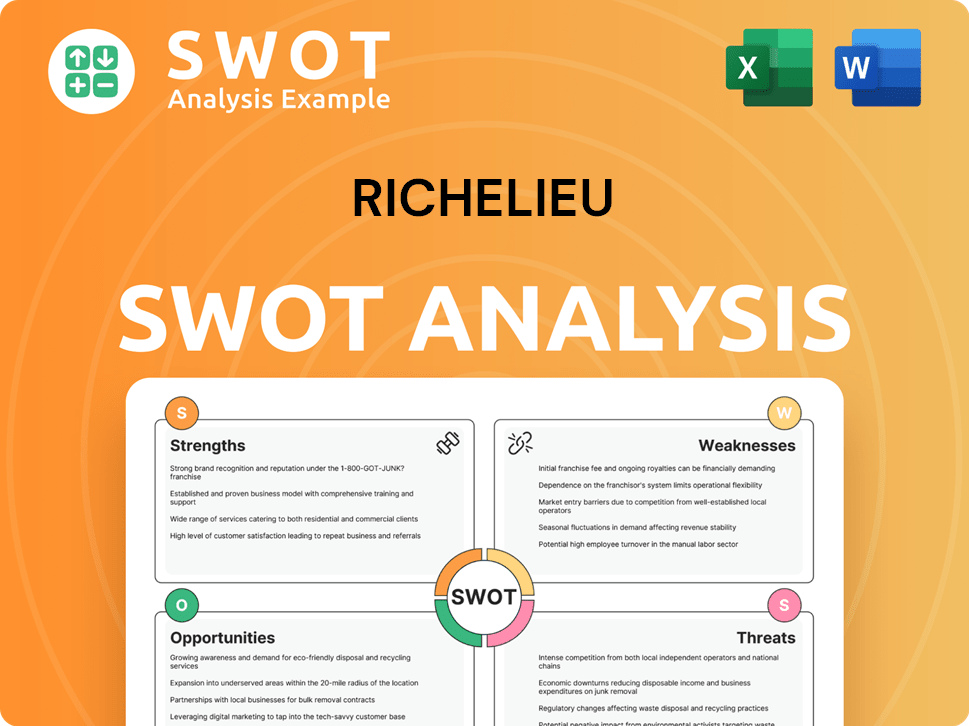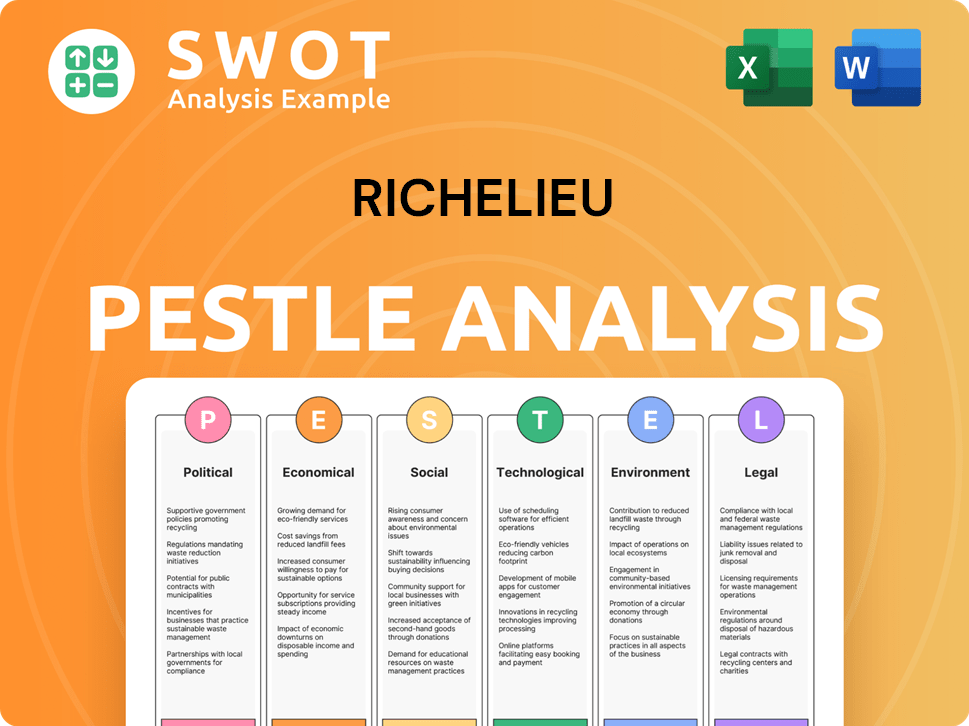Richelieu Bundle
Who Really Owns Richelieu Hardware?
Understanding the ownership structure of any company is crucial for investors and stakeholders alike. Richelieu Hardware Ltd., a major player in the North American hardware market, offers a fascinating case study in corporate ownership dynamics. Unraveling Richelieu SWOT Analysis, and the evolution of its ownership reveals valuable insights into its strategic direction and future prospects.

Founded in 1968 and based in Montreal, Quebec, Richelieu Company has grown significantly, but who exactly holds the reins today? This exploration into Richelieu company ownership will examine the company's history, key stakeholders, and recent trends, offering a comprehensive view of its ownership structure. Learn about Richelieu company details, including its leadership and financial performance, to better understand its position in the market. The analysis will also cover Richelieu company information, including its legal status and subsidiaries.
Who Founded Richelieu?
The story of Richelieu Company begins with its incorporation on September 16, 1968. While the exact initial ownership structure isn't fully detailed in recent public records, the influence of key figures like Richard Lord, who has been central to the company's leadership for decades, is evident.
Richard Lord, serving as President and CEO since at least 1988, holds a significant stake in the company. His direct ownership of 7.67% of the shares, valued at approximately CA$148.52 million, underscores the founder's enduring presence and commitment to the company's success. This substantial personal investment highlights the continuity of leadership from the early days.
Richelieu Finance Ltd. is noted as the 100% owner of Richelieu Hardware Canada Ltd., which provides insight into the broader corporate structure. The transition from private ownership to a publicly traded entity occurred with the initial public offering (IPO) on July 27, 1993, which was followed by a secondary distribution.
The IPO marked a significant shift for the company, moving from private to public ownership. The long tenure of key management, including Richard Lord, suggests a stable core of leadership and ownership. Here's a breakdown:
- Incorporation Date: September 16, 1968.
- IPO Date: July 27, 1993.
- Key Figure: Richard Lord, President and CEO since at least 1988.
- Richard Lord's Ownership: 7.67% of shares, valued at approximately CA$148.52 million.
- Subsidiary Ownership: Richelieu Finance Ltd. owns 100% of Richelieu Hardware Canada Ltd.
Richelieu SWOT Analysis
- Complete SWOT Breakdown
- Fully Customizable
- Editable in Excel & Word
- Professional Formatting
- Investor-Ready Format

How Has Richelieu’s Ownership Changed Over Time?
The ownership structure of the Richelieu Company, since its initial public offering (IPO) in 1993, has seen a shift towards greater institutional involvement. As a publicly traded entity, the major shareholders are influenced by institutional investors, mutual funds, and individual insiders. Understanding the evolution of Richelieu's ownership provides insight into its strategic direction and financial health. The company's journey from a private entity to a publicly traded corporation has been marked by significant changes in its shareholder base, reflecting its growth and adaptation to market dynamics. This evolution is crucial for understanding the current Richelieu Company ownership structure.
As of June 12, 2025, data from Simply Wall St. indicates key institutional shareholders in Richelieu Hardware Ltd. These include Mawer Investment Management Ltd., Invesco Ltd., RBC Global Asset Management Inc., and T. Rowe Price Group, Inc. Further insights from Fintel, as of May 16, 2025, show that Richelieu Hardware Ltd. (CA:RCH) has 63 institutional owners, collectively holding a total of 7,930,809 shares. The largest institutional holders include Fidelity Series International Small Cap Fund (FSTSX), Neuberger Berman Genesis Fund Investor Class (NBGNX), and Fidelity International Small Cap Opportunities Fund (FSCOX). These figures highlight the significant role institutional investors play in the company's ownership.
| Shareholder | Shares Held (as of May 16, 2025) | Percentage of Ownership |
|---|---|---|
| Fidelity Series International Small Cap Fund (FSTSX) | Data not available | Data not available |
| Neuberger Berman Genesis Fund Investor Class (NBGNX) | Data not available | Data not available |
| Fidelity International Small Cap Opportunities Fund (FSCOX) | Data not available | Data not available |
Richard Lord, the President and CEO, remains a significant individual shareholder, holding 7.67% of the company's shares directly. This substantial insider ownership helps align his interests with the company's long-term performance. The company's financial performance is also noteworthy; for the fiscal year ending November 30, 2024, total sales reached $1.8 billion, demonstrating its continued growth and market position. For more details, you can also explore the Revenue Streams & Business Model of Richelieu. Richelieu's strategic acquisitions have also contributed to its sales growth and market expansion. These factors have enabled Richelieu to maintain a strong financial position, with working capital of $612.9 million as of November 30, 2024.
The ownership of Richelieu Company is primarily influenced by institutional investors and key insiders.
- Institutional investors hold a significant portion of the shares.
- The CEO, Richard Lord, maintains a substantial individual stake.
- Strategic acquisitions and financial performance indicate growth.
- The company's strong financial position is supported by working capital.
Richelieu PESTLE Analysis
- Covers All 6 PESTLE Categories
- No Research Needed – Save Hours of Work
- Built by Experts, Trusted by Consultants
- Instant Download, Ready to Use
- 100% Editable, Fully Customizable

Who Sits on Richelieu’s Board?
The current Board of Directors of the Richelieu Company plays a crucial role in its governance. The board is composed of both executive and independent directors. Richard Lord serves as the CEO, President, and Executive Director. Sylvie Vachon holds the position of Independent Chairwoman of the Board. Other board members include Marc Poulin, Pierre Pomerleau, Lucie Chabot, François Gratton, and Marie Lemay. These individuals bring a variety of perspectives to the board, with some representing major shareholders or holding independent seats. Understanding the composition of the board is key to understanding the Growth Strategy of Richelieu.
The board's composition reflects a balance of experience and independence, which is typical for publicly traded companies. This structure aims to ensure effective oversight and strategic direction for the company. The board's decisions are critical in shaping the company's future, including its financial performance and strategic initiatives. The board's role is to protect shareholder interests and ensure the company operates in a responsible and sustainable manner.
| Board Member | Title | Role |
|---|---|---|
| Richard Lord | CEO, President, and Executive Director | Executive Leadership |
| Sylvie Vachon | Independent Chairwoman | Board Oversight |
| Marc Poulin | Director | Board Member |
| Pierre Pomerleau | Director | Board Member |
| Lucie Chabot | Director | Board Member |
| François Gratton | Director | Board Member |
| Marie Lemay | Director | Board Member |
The voting structure of Richelieu Hardware Ltd. is based on common shares, with each share entitling its holder to one vote. As of January 31, 2024, the company had 56,121,390 outstanding shares. The election of directors is a regular agenda item at the Annual General Meeting of Shareholders, with the most recent election confirming the proposed directors on April 10, 2025. Richard Lord's significant direct ownership of 7.67% of the company's shares provides him with substantial voting power. There is no information in the provided context to suggest dual-class shares or special voting rights.
The ownership structure of Richelieu Company is straightforward, with voting rights tied to common shares. This structure ensures that voting power is proportional to share ownership.
- Richard Lord holds a significant percentage of shares, influencing voting outcomes.
- The board's composition balances executive and independent directors.
- Shareholders vote on director elections at the Annual General Meeting.
- The company's legal status is public, with shares traded on the stock market.
Richelieu Business Model Canvas
- Complete 9-Block Business Model Canvas
- Effortlessly Communicate Your Business Strategy
- Investor-Ready BMC Format
- 100% Editable and Customizable
- Clear and Structured Layout

What Recent Changes Have Shaped Richelieu’s Ownership Landscape?
Over the past few years, the ownership structure of the company has been marked by a consistent strategy of growth. This has been achieved through a combination of internal initiatives and strategic acquisitions. In fiscal year 2024, the company's consolidated sales reached $1.8 billion, a 2.5% increase from the previous year. This growth was significantly supported by seven acquisitions across Canada and the U.S., contributing approximately $100 million in additional annual sales. This indicates an active approach to expanding its market presence and capabilities.
Looking ahead to fiscal year 2025, the company has continued its acquisition trend, completing five new acquisitions since the start of the year. These acquisitions are expected to add approximately $50 million in annual sales. Institutional investors continue to hold a significant portion of the company's shares, with 63 institutional owners holding over 7.9 million shares as of May 2025. This suggests a strong level of confidence from institutional investors in the company's long-term prospects and strategic direction. For more details, you can check out Target Market of Richelieu.
Despite these positive developments, the company experienced some margin compression and a decline in net earnings attributable to shareholders, which fell 23.1% to $85.8 million, or $1.53 per diluted share, for the fiscal year ended November 30, 2024. However, the company increased its quarterly dividend by 2.2% to $0.1533 per share for the first quarter of 2025, reflecting confidence in its financial health and future growth potential. The company anticipates growth opportunities from North America's housing shortage and the expected recovery of the renovation market in 2025.
The company's ownership profile includes a significant presence of institutional investors, holding over 7.9 million shares as of May 2025. This indicates a stable and confident investor base. The company's strategic acquisitions, such as those in fiscal years 2024 and 2025, have expanded its market reach.
While sales increased to $1.8 billion in fiscal 2024, net earnings declined. Despite this, the company increased its quarterly dividend. The company is optimistic about future growth. The company is also focused on managing its financial health.
The company has actively pursued acquisitions to fuel growth. These acquisitions have contributed significantly to the company's sales. These acquisitions have expanded the company's footprint across Canada and the U.S.
The company is positioning itself to benefit from the housing market. The company anticipates growth from the renovation market recovery. The company's dividend increase reflects confidence in its future.
Richelieu Porter's Five Forces Analysis
- Covers All 5 Competitive Forces in Detail
- Structured for Consultants, Students, and Founders
- 100% Editable in Microsoft Word & Excel
- Instant Digital Download – Use Immediately
- Compatible with Mac & PC – Fully Unlocked

Related Blogs
- What are Mission Vision & Core Values of Richelieu Company?
- What is Competitive Landscape of Richelieu Company?
- What is Growth Strategy and Future Prospects of Richelieu Company?
- How Does Richelieu Company Work?
- What is Sales and Marketing Strategy of Richelieu Company?
- What is Brief History of Richelieu Company?
- What is Customer Demographics and Target Market of Richelieu Company?
Disclaimer
All information, articles, and product details provided on this website are for general informational and educational purposes only. We do not claim any ownership over, nor do we intend to infringe upon, any trademarks, copyrights, logos, brand names, or other intellectual property mentioned or depicted on this site. Such intellectual property remains the property of its respective owners, and any references here are made solely for identification or informational purposes, without implying any affiliation, endorsement, or partnership.
We make no representations or warranties, express or implied, regarding the accuracy, completeness, or suitability of any content or products presented. Nothing on this website should be construed as legal, tax, investment, financial, medical, or other professional advice. In addition, no part of this site—including articles or product references—constitutes a solicitation, recommendation, endorsement, advertisement, or offer to buy or sell any securities, franchises, or other financial instruments, particularly in jurisdictions where such activity would be unlawful.
All content is of a general nature and may not address the specific circumstances of any individual or entity. It is not a substitute for professional advice or services. Any actions you take based on the information provided here are strictly at your own risk. You accept full responsibility for any decisions or outcomes arising from your use of this website and agree to release us from any liability in connection with your use of, or reliance upon, the content or products found herein.